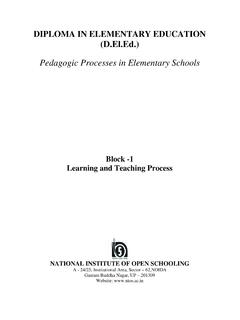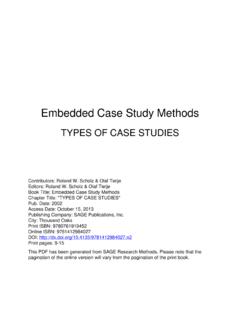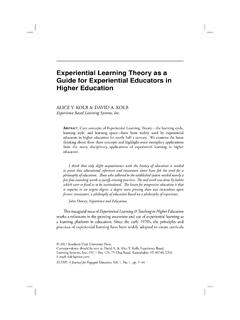Transcription of Original Contribution EXPERIENTIAL LEARNING
1 Trakia Journal of Sciences, Vol. 2, No. 4, 2004 36 Trakia Journal of Sciences, Vol. 2, No. 4, pp 36-39, 2004 Copyright 2004 Trakia University Available online at: ISSN 1312-1723 Original Contribution EXPERIENTIAL LEARNING Valentina Sharlanova* Department of Information and Qualification of Teachers, Trakia University, 9 Armejska Str., Stara Zagora 6010, Bulgaria ABSTRACT The EXPERIENTIAL LEARNING theory and the Kolb s LEARNING cycle are some of the most widely known modern educational theories. They take an important place at the formulation of the modernisation of the Bulgarian education in the movement from traditional to person-oriented educational process.
2 The purpose of this article is to show the opportunities of these concepts. The implementation of Kolb s cycle, as well as its advantages, difficulties, and methods are discussed. Key words: person-oriented educational process, teaching and LEARNING , EXPERIENTIAL LEARNING theory, Kolb s LEARNING cycle INTRODUCTION Kolb s EXPERIENTIAL LEARNING theory is one of the most popular and most frequently cited educational theories (8, 9). It takes an important place at the formulation of the modernisation of the Bulgarian education (10, 11) Fruitful work on EXPERIENTIAL LEARNING was published in 1984.
3 Since then, Kolb has had a rising influence on teachers and trainers, especially among those whose students are above 16 years. Kolb is one of the most influential researchers in his field because he provides a solid theoretical base that is absent in the work of many other authors. According to Kolb (1984)(9), LEARNING is a process, in which knowledge is created through transformation of experience. His theories present a way of constructing and alternation in the course of study, and provide concrete understanding of how a class or a whole course of study can be taught in order to have better LEARNING by the students.
4 The EXPERIENTIAL LEARNING theory involves studying in four phases connected with doing, sensing, observing, reflecting, thinking and planning. An important characteristic of the theories is that different phases are connected with particular LEARNING styles. People differ in their own LEARNING styles. Accepting this is an important premise that enables the students to realise the possible Correspondence to: 22V Ivan Pashinov Str., Stara Zagora 6014, Bulgaria; phone # 359-42-78288, E-mail: alternative approaches and to become more flexible in different LEARNING situations.
5 Teachers also need to realise their own LEARNING style as a basis for development of effective teaching and study strategies. Studying can suffer if there is an underlined discrepancy between the style of the students and the style of the teacher. Kolb s theory is affirmed as a LEARNING theory that confirms all main aspects of active LEARNING (1). It provides theoretical argument of independent LEARNING , LEARNING by doing, work-based LEARNING , and problem-based LEARNING . The theory has a vast range of application, including helping students realise themselves, helping teachers become reflexive teachers, identifying LEARNING styles of students, and development of key teacher s skills.
6 It also helps in development of group project work and deciding how information and communication technologies can aid the process of LEARNING . The advantages of Kolb s theory can be summarised in the following way (6): Provides ready directions for application. Gives directions for the necessary range of education methods. Provides effective connection between theory and practice. Offers a theoretical argument of things that many teachers apply and need advice on how to improve their practice. Clearly formulates the importance of students to reflect and the importance of SHARLANOVA V.
7 Trakia Journal of Sciences, Vol. 2, No. 4, 2004 37providing feedback in order to stimulate their studying. Helps to rationalise the way of combining LEARNING styles so that LEARNING can become more effective. Without any effort, can be used in all subject areas. Can be used by an individual, by teams, or by whole organisations. Can be used in a particular lesson, session, or long course of study. DISSCUSSION In his research David Kolb uses works by John Dewey and Kurt Levin (8, 9). Kolb, according to Zuber-Skerritt, creates a broad theory that provides the basis of education approach and LEARNING as a process of lifelong LEARNING ; a process that is based on the intellectual traditions of the philosophy, the cognitive and social psychology (14).
8 Kolb s model can be used as a general description of the LEARNING process, but his emphasis on reflection definitely puts him in the group of LEARNING based on experience. Boreham (1987) (2) says that the concept of EXPERIENTIAL LEARNING really means LEARNING by reflection on the experience . Without reflection on experience, students are in danger to continue to make the same mistakes over and over again. The essence of Kolb s model is just a description of the LEARNING process, which is pictured as a cycle made of four phases.
9 In the model it is shown how experience is transformed through reflection in ideas and concepts, which in turn are used for active experimenting and choice for new experience. Kolb connects with those four phases the Concrete Experience (CE) -doing, Reflexive Observation (RO) - observing, Abstract Conceptualising (АC) thinking, and Active Experimenting (АE) planning. They follow one after another in a cycle (Fig. 1). Figure 1: Concrete Experience the student is an active participant Reflexive Observation the student consciously reflexes on experience Abstract Conceptualising the student tries to conceptualise theory or model of what he has observed Active Experimenting the student tries to plan how to test the model, or the theory, or the plan for the forthcoming experience The cycle can be entered at any point, but the phases must be followed consecutively.
10 In that way the LEARNING cycle provides feedback that is the base of a new action and evaluating the consequences of the action. The students must pass through the cycle a couple of times. Then it can be called a spiral of cycle. Kolb briefly conceptualises the process of research as a spiral of action and examinations consisting of four general moments: plan, action, observation, and reflection (15). The description of all the LEARNING cycle phases is: First phase. Concrete Experience /trying or involving in doing . The individual, the team, or the organisation just does the task.







